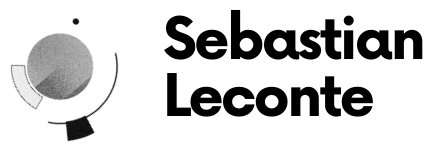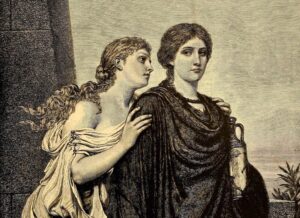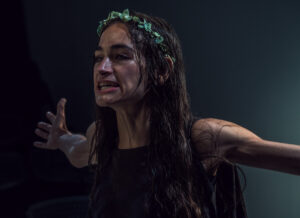Unit 2
Exploring Contemporary Interpretations and Adaptations of Sophocles’ Antigone: An Annotated Bibliography
For ages, playwrights, filmmakers, and other artists have drawn inspiration from Greek tragedy. Sophocles’ Antigone, which relates the tale of a young woman who rejects the king’s order to bury her brother who died in combat against the state, is one of the most enduring and significant of these works. Many interpretations and adaptations of the play have been made over time, reflecting the shifting social, political, and cultural issues of each period. This annotated bibliography tries to investigate how Antigone has been interpreted and adapted in modern times to represent current concerns and difficulties.
As a point of departure for this study, it’s critical to recognize that Antigone’s interpretation and adaption are not novelties. Since the play’s first performance in Athens in the fifth century BCE, it has actually undergone numerous adaptations. This annotated bibliography, however, focuses on contemporary adaptations, especially those from the twentieth and twenty-first centuries. These versions have addressed a variety of subjects, including political oppression and resistance as well as gender and racism. This annotated bibliography aims to offer insight on the ways in which Antigone has been remade to represent the concerns and values of contemporary society by examining a few of these versions.
This annotated bibliography’s central research topic is “How has the interpretation and adaption of the Greek tragedy Antigone changed over time to reflect modern concerns and
issues?” A variety of research papers, essays, and other sources, each presenting a different viewpoint on the ways in which Antigone has been interpreted and altered, have all been consulted in order to respond to this subject. To highlight the main topics and concerns that have been examined in the Antigone adaption, the materials have been arranged according to themes. These topics include globalization, political resistance, race and ethnicity, and gender and sexuality.
PBS NewsHour. “House Seats: Antigone in Ferguson.” YouTube, 13 Mar. 2019, www.youtube.com/watch?v=mjK8WzKIaZ0.
This source is a video documentary that examines the special staging of “Antigone” that took place in St. Louis in the wake of Michael Brown’s murder. The PBS NewsHour documentary, “House Seats: Antigone in Ferguson,” offers a thorough look at the play’s creation, rehearsing, and performances. The performance, which was the result of a partnership between a theatrical group and a neighborhood organization, sought to examine themes of racial justice and police brutality.
Interviews with the cast, crew, and community people engaged in the play’s creation are included in the video documentary, which sheds light on how this particular adaptation of the classic tragedy came to be created. The play’s scenes are also performed in the video, giving spectators a feel of the play’s emotional impact and strength.
This “Antigone” adaptation emphasizes the play’s ongoing applicability to current social and political challenges, as well as the ways in which it can be employed to incite meaningful dialogue and spur social change. The St. Louis theater group and community organization were
able to harness the power of theater to draw attention to these pressing issues and foster healing and understanding in their community by changing the play to address issues of racial justice and police violence. The video documentary offers a potent illustration of how “Antigone” can be modified and recreated to address modern issues and include viewers in significant social and political discussions.
Lambrianidis, C. (2015, August 18). Antigone Now: Greek Tragedy Debate. The Theatre Times. https://thetheatretimes.com/antigone-now-greek-tragedy-debate/
Christine Lambrianidis authored the article “Antigone Now: Greek Tragedy is the Discussion We Have to Have,” which was released on August 18, 2015. The discussion in the piece centers on Greek tragedy, which, according to Lambrianidis, is still the most contemporary style of theater since it isn’t hesitant to call into question everything we hold dear. According to the article, there have been many contemporary adaptations of Greek tragedies in Australia as well as the UK. This is a sign of the times we live in, when we are starting to question the ethics of democracy, something Greek tragedy was designed to achieve.
The article focuses on a contemporary adaptation of Antigone by Sophocles that was presented in 2015 at Melbourne’s Malthouse Theatre. Jane Montgomery Griffiths, a Classical Studies expert who is proficient in Ancient Greek, wrote the adaptation. As a result, she was able to faithfully translate and adapt the subtleties of Greek verse into a contemporary Australian context. The distinction between translation and adaptation is ambiguous in Griffiths’ rendition as she courageously exposes the veil of silence surrounding contemporary asylum seeker and anti-terrorism policies, revealing the voices of the dead and dying in Australian society.
According to the article, Greek tragedy originated as a religious festival called the City Dionysia in Athens in the fifth century B.C. and has since spread around the world. Male and white inhabitants of Athens had a civic duty to go to the theater to watch competing retellings of well-known mythology. Politicians, whose primary objective was to indoctrinate individuals into the idea of democracy that glorified debate, typically provided financial support to playwrights.
According to the article, Greek tragedy continues to be the ideal medium for philosophers since it can be tailored to fit any episteme, from dialectics to gender performativity. This is true for philosophers from Hegel to Butler. Greek tragedy, according to the essay, can be adapted to any setting and time period, yet it continues to alter and evolve, reflecting our private anxieties in public ways.
The essay ends by pointing out that this new rendition of Antigone fearlessly depicts the wretched other, which is personified by the corpses that predominate and echo on stage, rather than the self. The goal of Aristotelian catharsis is to release our repressed anxieties and sorrows. Greek tragedy was utilized by Freud to depict unconscious desire, by Lacan to show desire in its purest form, and by Zizek to show how it can be politically risky. The “danger” in this play, however, is not the blood or the puke, but rather the banally uninterested way that death and power are portrayed. In actuality, this serves as an example of what political scholar Hannah Arendt referred to as the banality of evil.
Batuman, Elif. “Can Greek Tragedy Get Us Through the Pandemic? A theatre company has spent years bringing catharsis to the traumatized. In the coronavirus era, that’s all of us.” The New Yorker, 1 Sept. 2020, https://www.newyorker.com/culture/culture-desk/can-greek-tragedy-get-us-through-the-pandemi c.
Greek tragedy has been altered and reinterpreted innumerable times throughout history and has long served as a source of inspiration for playwrights, scholars, and artists alike. Yet, the current COVID-19 epidemic has generated a distinct set of problems that have forced new perspectives on the significance and applicability of these antiquated studies. Elif Batuman examines the possibility of Greek tragedy as a therapy for coping with the trauma and uncertainty of the epidemic in her piece “Can Greek Tragedy Get Us Through the Pandemic?” that was published in The New Yorker in September 2020.
The author examines how the ageless themes and lessons found in classic Greek tragedies like Oedipus Rex and Antigone can provide solace and guidance in these trying times. Greek tragedy has long been interested in the human condition, delving into issues like social order, mortality, and power struggles. These themes take on a new relevance in the context of the pandemic as people struggle with feelings of helplessness, loss, and loneliness. According to Batuman, when we engage with these tales, we might learn new things about our own lives and find comfort in the knowledge that we are not alone in our challenges.
According to the article, Greek tragedy’s capacity to foster catharsis is one of its major advantages. People may digest and let out their feelings in a secure and controlled setting because to the stories’ emotional intensity. This can be especially helpful during times of crisis because emotions are frequently heightened and challenging to control. We might get a sense of
connection and validation through the stories and characters that can be challenging to find on our own.
Furthermore, Batuman emphasizes how flexible Greek tragedy is, emphasizing how it has been applied in a variety of historical situations, such as education and therapy. According to the report, many therapists have experienced encouraging results when using Greek tragedy to assist patients in processing difficult emotions and traumatic experiences. These stories are effective guides for comprehending and managing challenging circumstances due to the universality of the issues and the relatability of the characters.
The article “Can Greek Tragedy Help Us Through the Pandemic?” concludes by offering a provocative viewpoint on the possibility of classical Greek tragedies as a means of overcoming the difficulties presented by the COVID-19 pandemic. The essay demonstrates how these tales can serve as a source of solace, understanding, and catharsis during trying times by studying the ageless themes and lessons they contain. We might be better able to negotiate the difficulties that lie ahead and discover meaning and purpose in the face of crises by actively interacting with these stories.
Gutterman-Johns, Cassandra J.S. “The Practice and Purpose of Adaptation of Classical Texts.” Dissertation, Oberlin College, 2018. https://etd.ohiolink.edu/apexprod/rws_etd/send_file/send?accession=oberlin1656800442917444 &disposition=inline.
The article “The Practice and Purpose of Adapting Classical Texts” by Cassandra J.S. Gutterman-Johns examines the works of two modern playwrights, A-lan Holt and Zora Howard, and how they used adaptation to recreate classic Western writings with an emphasis on the experiences of people of color. By reinventing the stories in their adaptations, Holt and Howard use theater as a tool for social change. They do this to give disadvantaged voices a platform and to disrupt the cycles that are reinforced by traditional texts.
The paper emphasizes how Holt and Howard approached adaptation in distinct ways. Whereas Howard focuses on extrapolation, Holt rewrites old literature using interpolarity and motivating techniques. Despite their disparate approaches, both playwrights leave their audiences with a sense of optimism for the future, anticipating a world where traditional customs, underrepresented stories, and the pleasure of Black and Indigenous people have greater room.
The article focuses on how these plays serve to start the discourse rather than having their work finish when the curtain closes. The study examines the significance of cycles in adaptation and how they serve as a reminder of the perilous beliefs supported by ancient texts through interviews with Howard. Theater may be a tool for social change by working within these cycles and proposing new, better realities or prospective futures.
The essay also stresses how crucial it is to involve audiences in the discussions that these adaptations have sparked. Both Holt and Howard employ several strategies to engage the audience in dialogue as they tell their stories. Although Howard approaches the audience as a member of the church and treats everyone in the theater as a member of the Greek chorus, Holt concentrates on educating audiences about history that was likely left out of American history in high school.
The piece also examines the effects these adaptations have on the actors involved. These adaptations struggle for the visibility of underrepresented communities by filling the stage with Black and Indigenous performers. In order to decolonize old texts and use them to tell new tales, this kind of community building is essential.
The article concludes by showing how adaptation might be utilized to produce theater that steers clear of the cycles that classical texts perpetuate and in favor of actual, palpable change. Holt and Howard’s work demonstrates the ability of theater to give voice to underrepresented viewpoints, inform viewers, and engender social change. These revisions serve as a reminder that old writings can still be meaningful and relevant today if they are revised and altered with an eye toward building a more just and equitable future.
Abed Alwan, Hassan Ali. “A Study of Modern Adaptations of Antigone.” University of Babylon, College of Education for Human Sciences, Department of English, 2022, https://cdnx.uobabylon.edu.iq/undergrad_projs/HW0BepRnz0u97tiOCWDZTQ.pdf.
Sophocles’ Greek play Antigone has undergone numerous adaptations and interpretations in the modern era to address current problems and difficulties. This essay explores the development of Antigone’s interpretation and adaption, as well as its applicability to current political and social challenges.
Antigone is shown in Sophocles’ Antigone as a rebel but not a revolutionary. She demonstrates how the law and dissent are created and generated, rather than trying to topple Creon’s autocracy and install a more democratic regime. She demonstrates the need for conflict
between the government and the general public. Antigone is depicted as a revolutionary figure who challenges the existing social and political order in Slavoj Zizek’s rendition of the classic work. Antigone is a call for radical political struggle in Zizek’s adaptation, and her uprising against Creon is portrayed as a way to construct a new and just order.
Despite the fact that Zizek’s adaption ignores Antigone and highlights the inherent flaws in opposing the status quo, the play nonetheless serves as a call to action for those with a desire for revolution. According to Zizek, there are only two possibilities: either the existing Creon will continue to rule or a new, more powerful Creon will take over.
Zizek’s Antigone diverges from Sophocles’ Antigone and his earlier treatment of the protagonist. While he formerly thought of her as a genuine performer, he makes an effort to show her as a troublesome failure in the 2016 rendition. He calls her a “monster woman” who pretends to be a tragic hero while concealing her true nature. She has actually been rendered immortal as a result of her good deeds and is a victim of forces beyond her control. Zizek also departs from the conventional tragedy model, in which the chorus rarely participates in the proceedings, by having the chorus carry out a genuine revolutionary act.
Both modern democratic ideology and the burial of the war dead are not the only topics covered in Antigone. It is a tale about a struggle between opposing wills, ideologies, and allegiances. It has to do with legitimacy, authority, and bounds. It is about dedication, tenacity, and integrity. Antigone by Sophocles can be seen in any Greek theater and has been translated into many different languages and performed in innumerable theaters across the world. But, the echoes of current flashpoints of unrest gave it a greater urgency for its Athenian audience. On the other hand, Zizek’s interpretation of Antigone concentrates on politics in the particular meaning
of the construction of the state, emphasizing how crucial it is to challenge rigid structures and systems in order to enact a just order.
In conclusion, Antigone has been interpreted and adapted over the years to represent modern concerns and issues. It is still relevant today as a potent commentary on politics, power, and revolt. Antigone by Sophocles and its adaptation by Zizek offer opposing viewpoints on the character of Antigone and the significance of revolution in overthrowing repressive systems. We may learn more about how Antigone has been interpreted and adapted over time, which helps us understand how relevant it still is to modern political and social challenges.
In conclusion, the sources examined in this annotated bibliography show how the Greek tragedy Antigone has been interpreted and altered in modern times to represent current issues and concerns in a varied and diverse manner. Others place more emphasis on the psychological and emotional facets of Antigone’s persona, while some interpretations highlight the political and social ramifications of her uprising against power. While some interpretations focus on the play’s feminist elements, others investigate how the Chorus shapes the tragedy’s meaning.
Notwithstanding the disparities amongst the sources, a theme that unites them all is Antigone’s ongoing significance as a personification of resistance and disobedience against oppressive rule. The sources examined, whether viewed through feminist, political, or psychological lenses, show how powerfully Antigone may speak to current issues about power, justice, and the human condition. As a result, they offer insightful perspectives on the continuous importance of classical Greek play and its enduring relevance to modern culture and society.








